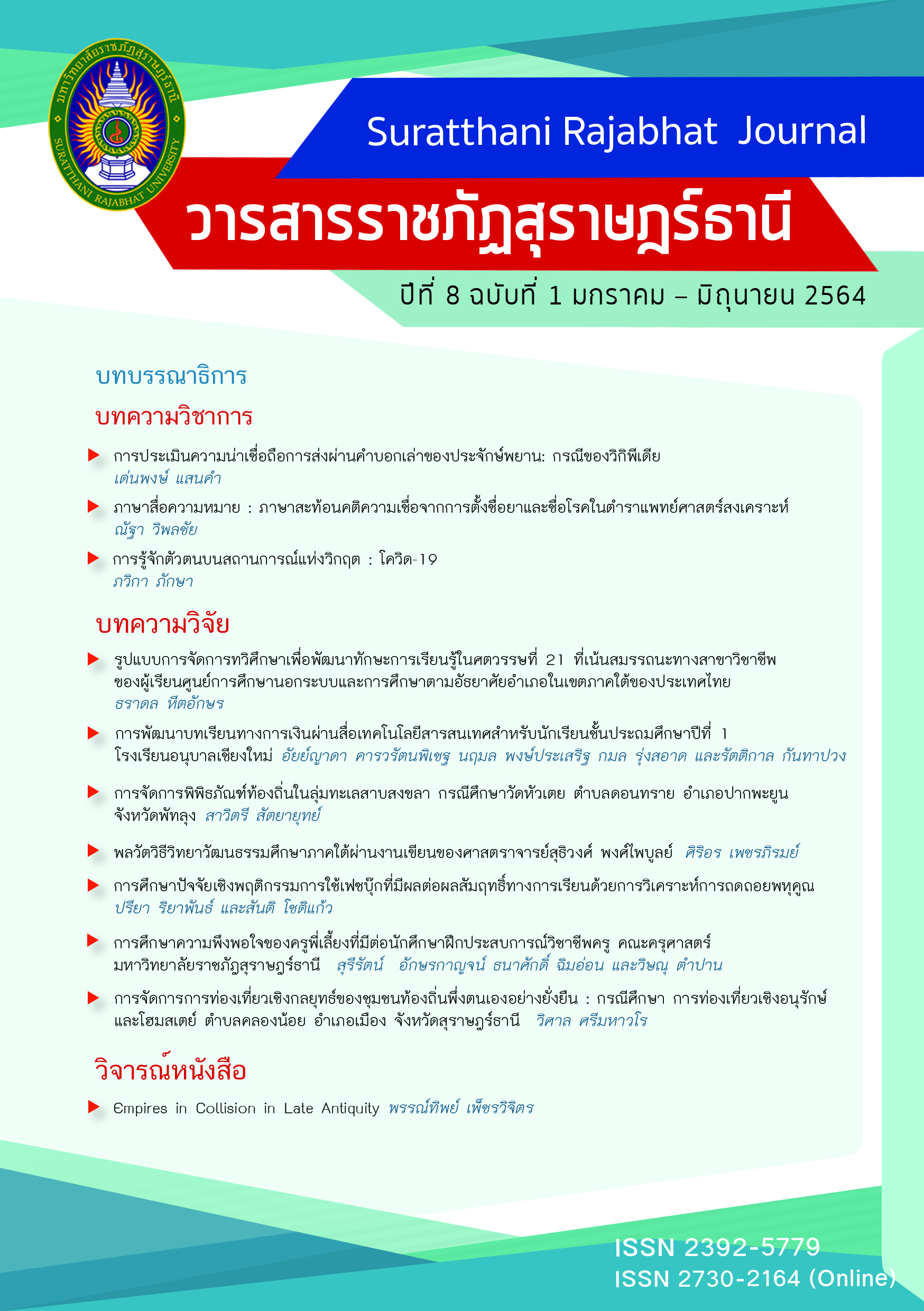A A Study of Facebook Usage Behavioral Factors Influence on Students’ Achievement by Multiple Regression Analysis
Main Article Content
Abstract
An objective of this research was to find Facebook usage behavioral factors and registration data that affect undergraduate students’ achievement. A data set obtained by Facebook API (Application Programming Interface) was used to build a multiple regression model where a dependent variable is students’ academic performance, i.e. final score, and independent variables are the Facebook usage behavioral factors retrieved by Facebook API that consist of the number of comments, the period of posting time to comment, and the number of reactions, collected and computed from students’ response to activity post and creating extra variables separated by five-activity types: attention, assignment, examination, announcement, and the other activities. Those are reflected from Facebook API as the behavioral use of social media. There is another independent variable which is the average time of the comments. The sample size of 320 involved in purposive sampling were used to analyze the model by R programming.
The results indicate that behavioral factors of social media usage which are attention, assignment, examination, like and average time of comments, and all reactions of other posts have an effect on graduate students’ achievement which is a final score with R2 = 72.30.
Article Details
References
งานทะเบียนและประมวลผล มหาวิทยาลัยสงขลานครินทร์ วิทยาเขตสุราษฎร์ธานี. (2562). สถิตินักศึกษา. http://reg.surat.psu.ac.th/stdsum_index.php? Page=2&search=&keyword=
รุ่งฤดี กล้าหาญ. (2557). ปัจจัยที่ส่งผลต่อผลสัมฤทธิ์ทางการเรียนภาคปฏิบัติของนิสิตพยาบาล ชั้นปีที่ 3 มหาวิทยาลัยศรีนครินทรวิโรฒ. วารสารพยาบาลทหารบก, 15(3), 412-420.
สำนักงานพัฒนาธุรกรรมทางอิเล็กทรอนิกส์ (สพธอ.). (2561). ETDA เปิดพฤติกรรมผู้ใช้อินเตอร์เน็ตปี 61. https://www.etda.or. th/publishing-detail/thailand-internet-user-profile-2018.html
Ainin, S., Naqshbandi, M. M., Moghavvemi, S., & Jaafar, N. S. (2015). Facebook usage, socialization and academic performance. Computers and Education, 83(1), 64-73.
Al-dheleai, Y. M. & Tasir, Z. (2017). Using Facebook for the Purpose of Students’ Interaction and its Correlation with Students’ Academic Performance. The Turkish Online Journal of Educational Technology. 16(4), 170-178.
Carreon, A. V., Valenzuela, M. M., Tayag, J. R., & Dizon, C. S. (2019). Students who spend more time on Facebook tend to have higher grades: Findings from a Philippine university. International Journal of Research Studies in Education, 8(4), 27-37.
Essays, UK. (2018). Facebook As A Learning Tool. https://www.ukessays. com/essays/education/facebook-as-a-learning-tool-educationessay .php?vref=1
Facebook.com. (2020a). Facebook Insight. https://www.facebook.com/ads/ audience-insights/people?act=1425764647661766&age=18&country =TH
Facebook.com. (2020b). About Facebook. https://about.fb.com/company-info/
Hassan, I. S. (2014). Facebook as a Tool for Teaching and Learning. https://www.researchgate.net/publication/282251534_FACEBOOK _ AS_A_TOOL_FOR_TEACHING_AND_ LEARNING/ citations
Junco, R. (2011). The relationship between frequency of Facebook use, participation in Facebook activities, and student engagement. Computers and Education, 58(1), 162-171.
Junco, R. (2015). Student class standing, Facebook use, and academic performance. Journal of Applied Developmental Psychology, 36(1), 18-29.
Kemp, S. (2020). DIGITAL 2020: APRIL GLOBAL STATSHOT. https://datarepo rtal.com/reports/digital-2020-april-global-statshot?fbclid=IwAR0Cp XDFF6Bu1LHNmam7Qz292FHQZ3idCKnhzoJKQ9umCaLFF7OscNo_ 3CY
Kemp, S. (2020). DIGITAL 2020: THAILAND. https://datareportal.com/reports /digital-2020-thailand
Moghavvemi, S., Sulaiman, A., Aziz, A. A., & Wai, P. S. (2017). The Impact of Facebook Usage on Academic Performance. [Paper presentation]. 2017 International Conference on Research and Innovation in Information System, Langkawi.
Moore, D. S., Notz, W. I., & Flinger, M. A. (2013). The basic practice of statistics (6th ed.). W. H. Freeman and Company.
Murad, A., Gul, A., Changezi, R., Naz, A, & Khan, N. (2019). Effects of Facebook Usage on the Academic Performance on the Undergraduate Students of Quetta City. Clinical Social Work and Health Intervention, 10(2), 70-79.
Prescott, J., Stodart, M., Becket, G., & Wilson, S. (2013). The Experience of using Facebook as an Educational Tool. Health and Social Care Education, (0), 1-5.
Sereetrakul, W. (2013). Students’ facebook usage and academic achievement: a case study of private university in Thailand. Proceedings of the International Conference on Cognition and Exploratory Learning in Digital Age (CELDA), USA, 40-46.
Thuseethan, S. & Kuhanesan, S. (2014). Influence of facebook in Academic Performance of Sri Lankan University Students. Journal of Computer Science and Technology, 14(4), 28-35.
Wittawin. A. (2019). Infographic: Statistics of Facebook Usage in Thailand by Customer Insight.https://www.thumbsup.in.th/facebook-thai land-insight


